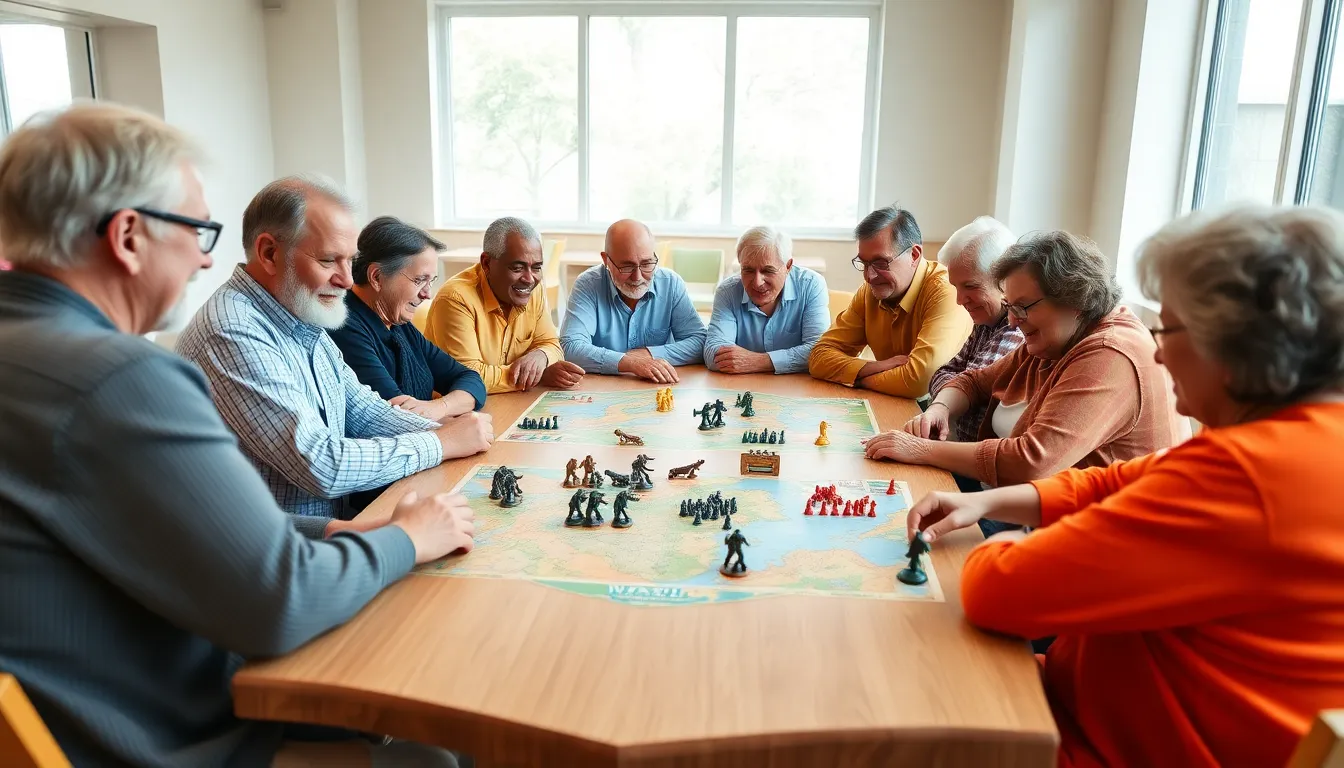Picture this: a group of seniors huddled around a table, dice in hand, strategizing like seasoned generals. War games might seem like they are only for the young and restless, but guess what? They pack a punch when it comes to engaging the wise and venerable crowd too. From conquering lands to forming alliances, these games provide many laughs and a few good-natured arguments. If you’ve ever wondered why war games have found their way into the hearts of our elders, buckle up as we explore this engaging landscape together.
Table of Contents
ToggleUnderstanding the Appeal of War Games for Seniors

War games are more than just dice rolls and moving pieces across a board. They resonate deeply with seniors, primarily due to nostalgia. Many have fond memories of playing similar games in their younger days, reliving past adventures or strategic escapades. They provide a comfortable escape, a way to connect with both old friends and new acquaintances. War games often require strategy, which keeps their minds sharp and their competitive spirits alive.
Also, the social aspect of these games can’t be overlooked. Playing together fosters camaraderie, enabling seniors to share stories and experiences that would otherwise remain untold. The thrill of devising the perfect strategy or outsmarting an opponent offers a sense of achievement that’s invaluable. After all, who doesn’t like the rush of victory, especially when it’s accompanied by a cheerful round of laughter?
Cognitive Benefits of Playing War Games
Engaging in war games doesn’t just add excitement to the daily routine: it also sharpens cognitive skills. Strategic thinking is a crucial element in these games, requiring players to analyze their situation, assess risks, and predict their opponents’ moves. This level of critical thinking is especially important as individuals age, helping to bolster mental acuity.
Also, war games enhance memory and recall, as players must remember rules, strategies, and their opponents’ past actions. Many games also incorporate elements of teamwork and communication which encourage players to articulate their thoughts clearly, an essential skill that can diminish without practice. Engaging regularly can lead to improved concentration and cognitive flexibility, both of which contribute to better overall mental health.
Popular War Games for Elders
When it comes to selecting the right war game for seniors, variety is paramount. Here’s a few popular options that have captured the imaginations of many:
- Ticket to Ride: This train-themed strategy game isn’t exclusively a war game but includes elements of competition and strategic route construction. Seniors love it for its simplicity and depth.
- Memoir ’44: Perfect for history buffs, this game engages players in World War II battles. It’s suitable for different skill levels, making it a versatile choice.
- ** Axis & Allies**: A more complex choice, this classic strategy board game allows players to command nations during World War II. It encourages longer gameplay sessions, perfect for dedicated enthusiasts.
- Risk: A classic indeed, Risk involves global domination, strategic alliances, and sometimes, backstabbing. It’s simple enough for beginners but allows room for tactical growth.
These games are not just for younger people or hardcore gamers. The right game can open doors to creativity, strategic thinking, and a fair bit of fun.
Tips for Choosing the Right War Game
Selecting the right war game involves considering several factors to ensure maximum enjoyment and accessibility. Here are a few tips:
- Assess Interests: Consider the themes and settings that resonate with the players. Some may prefer historical contexts, while others might enjoy whimsical, fantasy battles.
- Evaluate Complexity: Game complexity varies widely. While some seniors might thrive on challenging strategies, others may prefer something light and quick to learn. Always choose a game that matches the group’s skill level and patience.
- Check Player Count: Ensure the game accommodates the right number of players. Some games shine as a two-player experience, while others come alive in larger group settings.
- Look for Accessibility Features: Games with large text, simplified rules, and easy-to-handle pieces can make a significant difference in the experience of senior players.
By keeping these factors in mind, you’ll likely create an engaging and captivating experience for all players involved.
Creating a Social Experience Around War Gaming
War gaming can also be a fantastic social experience. Here are some ways to enhance the social aspect:
- Host Game Nights: Regular events foster stronger bonds and excitement. Rotating hosts can bring variety and fresh energy.
- Create Themed Events: Transform the gaming space into the era of the game being played. Decorations, costumes, and themed snacks can elevate the atmosphere and enhance immersion.
- Engage in Storytelling: Encourage players to share their strategies and the reasons behind their decisions. This storytelling aspect adds a personal touch and promotes deeper connections.
- Incorporate Friendly Competition: Little competitions within the group can spark excitement. Keeping a leaderboard or a trophy for the occasional winner can enhance the thrill.
These strategies encourage a sense of community, making the experience more enjoyable for everyone involved. After all, the laughter, friendly banter, and shared triumphs are often more memorable than the game itself.
